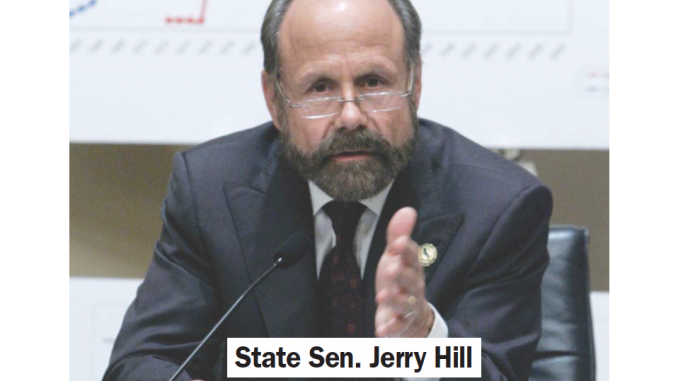
Bills to reopen access to Martins Beach and allow voters to decide whether to raise sales taxes for Caltrain have passed the Legislature and are headed for Gov. Jerry Brown’s desk. But a bill to require middle and high schools to start no earlier than 8:30 a.m. failed.
Those are among the highlights of the legislative session that ended Friday night in Sacramento.
One of the measures that passed, Senate Bill 42 by Jerry Hill, D-San Mateo, creates an account at the State Lands Commission that can accept funds if and when the state uses eminent domain to seize a road to restore public access to Martins Beach, south of Half Moon Bay. The road was closed when billionaire Vinod Khosla bought a beach estate there in 2009, causing consternation among beachgoers.
Caltrain tax
Another bill by Hill that passed, SB797, would allow the counties of San Mateo, San Francisco and Santa Clara to place a one-eighth-cent sales tax on the ballot to fund Caltrain operations. The tax would raise about $100 million a year, replacing contributions that each county now makes out of its transportation programs and provide funds for maintenance of trains. The tax would require two-thirds approval by the voters.
Hill also got a bill passed, SB20, that would require passengers and the driver of commercial buses to buckle up if the vehicles are equipped with seat belts.
School start times
One bill that failed was SB328 that would have required middle and high schools to start no earlier than 8:30 a.m.
The idea, author state Sen. Anthony Portantino, D-La Canada Flintridge, was to give kids more time to sleep in, resulting in better classroom performance.
In Palo Alto, however, there were concerns that opening schools along Arastradero Road at the same time in the morning would result in more traffic congestion than the road now sees after it was subject to a “road diet” in 2011. Currently, the schools stagger their start times.
Bridge tolls
A bill that passed, SB595, would put on the ballot in the nine Bay Area counties a measure to increase tolls on the seven state-owned bridges including the Dumbarton and San Mateo bridges.
The bill, by state Sen. Jim Beall, D-San Jose, would raise tolls by as much as $3. That would raise the rush-hour toll on the Bay Bridge to $9.
It would raise $4.45 billion over 25 years.
Among the projects that would get funds from the toll hike include:
• $375 million for BART’s tunnel between the Berryessa Flea Market and downtown San Jose;
• $500 million for more BART rail cars;
• $375 million to pay part of the tab to extend Caltrain from Fourth and King streets to downtown San Francisco;
• $300 million for new paid express lanes on Bay Area freeways.
Housing-crisis legislation
Drawing the most attention were three bills intended to ease the housing crisis and several others meant to show the state’s resistance to the Trump administration.
On the housing front, the Legislature passed:
• A $75 fee on mortgage refinances and other real estate transactions to finance low-income housing;
• A bill to put on the November 2018 ballot a $4 billion bond measure, with $3 billion to subsidize low-income homes and $1 billion for veterans’ home loans;
• A measure to allow developers to bypass local regulations for construction of multi-family affordable housing projects in cities that fail to meet housing quotas set by the Association of Bay Area Governments.
Senate Bill 35’s author, Scott Wiener, D-San Francisco, said, “We’re past the point where communities can choose whether to create housing or whether to opt out … All communities need to participate in creating the housing we so desperately need.”
Responding to Trump
Bills that passed in response to Trump administration policies call for:
• Making California a “Sanctuary State” by preventing police from assisting with Trump’s crackdown on illegal immigration by restricting communication between local officers and ICE agents about people in jail, with the exception of those convicted of most felonies within the past 15 years.
• Requiring employers to check if immigration agents have proper documents before allowing them to access a workplace or review employee information.
• Protecting information about climate change obtained by federal workers in California or state employees from censorship or destruction.
• Allocating $30 million for legal assistance and college financial aid for young people in the Deferred Action for Childhood Arrivals or DACA program.
All of the bills that were passed go to the desk of Gov. Brown, who can veto them or sign them into law.



